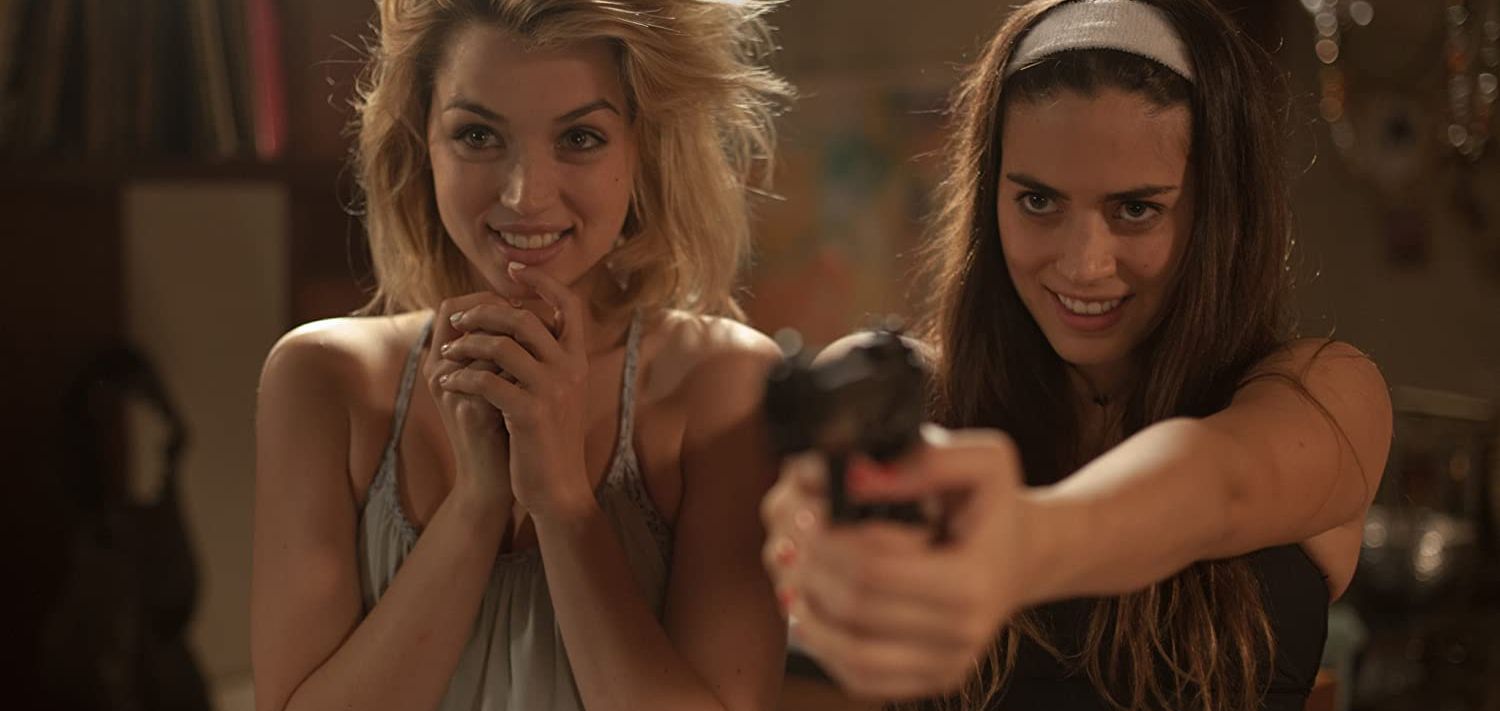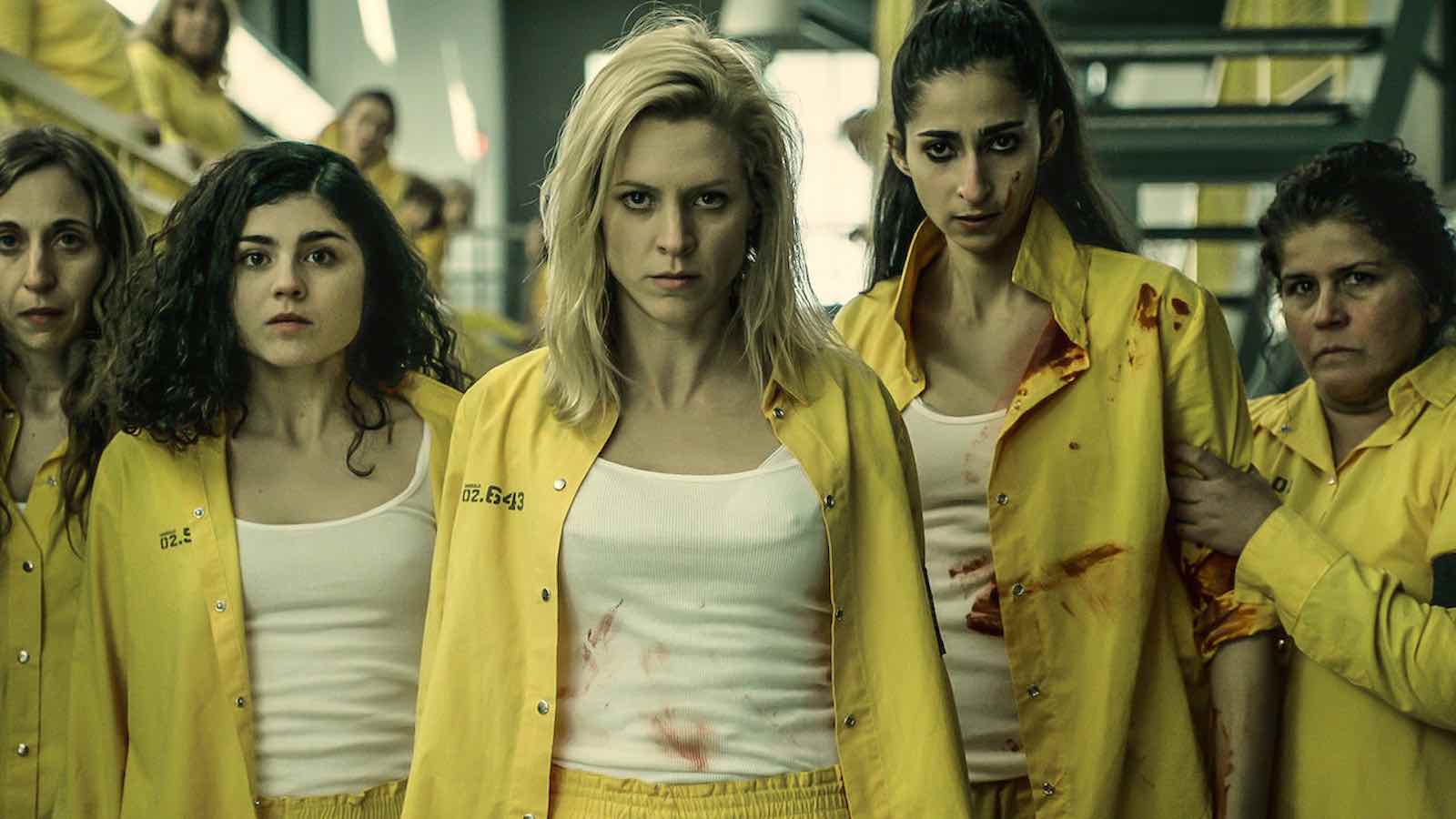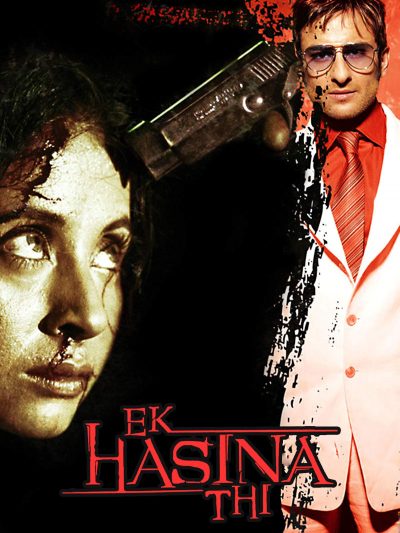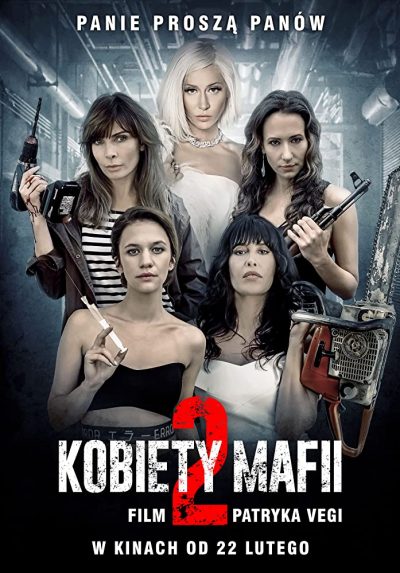★★★½
“I can only apologize, darling…”
 This is the kind of film which makes for very uncomfortable date night viewing, simply because the situation presented is likely to lead to awkward conversations. Happily married architect Evan Webber (Reeves) has the house to himself for the weekend, his wife having gone with their two kids to the seaside, leaving him free to work on a project. A stormy night ensues, until a knock at the door, and he finds two lost young women, Genesis (Izzo) and Bel (de Armas), shivering on the doorstep. He can hardly make them stay there, so lets them in. Almost immediately, something is wrong, though initially this falls into the “Too good to be true” category. For they are nymphomaniac flight attendants, and inevitably – though after a credible struggle – Evan succumbs to their relentless charms.
This is the kind of film which makes for very uncomfortable date night viewing, simply because the situation presented is likely to lead to awkward conversations. Happily married architect Evan Webber (Reeves) has the house to himself for the weekend, his wife having gone with their two kids to the seaside, leaving him free to work on a project. A stormy night ensues, until a knock at the door, and he finds two lost young women, Genesis (Izzo) and Bel (de Armas), shivering on the doorstep. He can hardly make them stay there, so lets them in. Almost immediately, something is wrong, though initially this falls into the “Too good to be true” category. For they are nymphomaniac flight attendants, and inevitably – though after a credible struggle – Evan succumbs to their relentless charms.
The next morning, however, the reality proves less pleasant, and it’s all downhill from there. For the pair are avenging angels, honey-trapping married men, then savagely punishing them for their infidelity, and Evan is not their first victim. This development should be no real surprise if you’ve seen Roth’s other films, where bad things almost inevitably tend to result from good. A nice trip to Europe became kidnapping, torture and murder in Hostel. Social activism turned into cannibalistic dismemberment in Green Inferno. So the first half of this was largely an exercise in waiting for things to go wrong, along with strenuously assuring Chris that, in similar circumstances, my assistance would strictly be limited to passing them towels through the letter-box. I highly recommend not deviating from this answer, under any circumstances. For she was firmly convinced, whatever happened to Evan in the second half was well-deserved.
The resulting punishment is certainly not pleasant, with his home-life wrecked, both literally and figuratively. Though there were a couple of ways it could have been improved. Firstly, even with some straggly facial hair, he’s still Keanu Reeves, not exactly your average guy. He likely has to beat off real nymphomaniac flight attendants with a stick, on an everyday basis. It’d have been more effective with a more homely leading man, to whom the audience could relate. And I’d rather have seen Genesis and Bel evaporate like smoke in the night, leaving no evidence of their presence, save their impact on Evan. A little more subtlety, and less scrawling of “DADDY’S LITTLE WHORE” on the family portraits would have gone a long way here, I feel.
Still, Roth is not exactly known for his delicate approach to cinema, and as a blunt instrument illustrating in female form the perils of infidelity, this works well enough. It’s also a rare entry in the “home invasion” field where the invaders are entirely women. À l’interieur (Inside) is one of the few predecessors there, and it’s no shame this doesn’t quite reach the same heights of sheer insanity – very few movies do. It’s still a cautionary tale which had me shifting uncomfortably in my seat often enough to justify its existence, as well as casting wary glances over at Chris.
Dir: Eli Roth
Star: Keanu Reeves, Ana de Armas, Lorenza Izzo, Aaron Burns





 This is the kind of film which I’d say was enjoyable, rather than being good. Indeed, if you want an illustration of the difference between the two, this movie is a good example. Sona Mukherjee (Fernandez) is the wife of respected doctor, Mrityunjoy Mukherjee (Bajpayee). But their life is upended when the bodies of six, formerly pregnant, unmarried women are found on their property. Sona believes her husband was framed – possibly by police inspector and former boyfriend Imran Shahid, (Raina). She takes the advice of a dubious lawyer, who suggests that if the serial killer was shown to be still active, that would prove her husband’s innocence. So Sona kidnaps another expectant young woman, Anushka Tiwari (Khan) to provide a seventh victim. Only… well, Sona is a bit crap as a serial killer, and Anushka is a feisty little thing with a black-belt in taekwondo, pregnancy be damned.
This is the kind of film which I’d say was enjoyable, rather than being good. Indeed, if you want an illustration of the difference between the two, this movie is a good example. Sona Mukherjee (Fernandez) is the wife of respected doctor, Mrityunjoy Mukherjee (Bajpayee). But their life is upended when the bodies of six, formerly pregnant, unmarried women are found on their property. Sona believes her husband was framed – possibly by police inspector and former boyfriend Imran Shahid, (Raina). She takes the advice of a dubious lawyer, who suggests that if the serial killer was shown to be still active, that would prove her husband’s innocence. So Sona kidnaps another expectant young woman, Anushka Tiwari (Khan) to provide a seventh victim. Only… well, Sona is a bit crap as a serial killer, and Anushka is a feisty little thing with a black-belt in taekwondo, pregnancy be damned. ★★★
★★★ Complete ranking of Enolas
Complete ranking of Enolas A somewhat cheesy melodrama, this throws together elements from Western pot-boilers Double Jeopardy and If Tomorrow Comes, adds a handful of Bollywood spice, and to be honest, probably overcooks the whole thing a bit. The title translates as “There Was a Beautiful Woman”, presumably referring to the heroine of the piece, travel agent Sarika (Matondkar). Into her office one day comes hunky businessman Karan Singh Rathod (Khan), and after some reluctance, she begins a relationship with him. However, it turns out he is actually a mobster, and manipulates her into taking a fall rather than incriminating him, which nets Sarika a seven-year prison sentence. Escaping from jail, she vows to destroy her former lover, and in turn, works on framing Karan with his criminal pals, by making it look like he murdered a colleague and stole money.
A somewhat cheesy melodrama, this throws together elements from Western pot-boilers Double Jeopardy and If Tomorrow Comes, adds a handful of Bollywood spice, and to be honest, probably overcooks the whole thing a bit. The title translates as “There Was a Beautiful Woman”, presumably referring to the heroine of the piece, travel agent Sarika (Matondkar). Into her office one day comes hunky businessman Karan Singh Rathod (Khan), and after some reluctance, she begins a relationship with him. However, it turns out he is actually a mobster, and manipulates her into taking a fall rather than incriminating him, which nets Sarika a seven-year prison sentence. Escaping from jail, she vows to destroy her former lover, and in turn, works on framing Karan with his criminal pals, by making it look like he murdered a colleague and stole money. There’s probably a decent movie in here. An interesting premise, occupying the nexus where religion and science cross, and some very effective hand-to-hand action sequences, would potentially have made for a decent 90 minutes of fun. The problem is, this actually runs for 10 x forty-minute episodes, and the result is stuffed so full of padding, that it could be used as a sofa. The nuns of the title are members of the Order of the Cruciform Sword, a group which has been fighting demonic entities for centuries. Chief among them is the bearer of the Halo, a divine relic which bestows its owner with great powers, including rapid healing and the ability to phase through solid objects.
There’s probably a decent movie in here. An interesting premise, occupying the nexus where religion and science cross, and some very effective hand-to-hand action sequences, would potentially have made for a decent 90 minutes of fun. The problem is, this actually runs for 10 x forty-minute episodes, and the result is stuffed so full of padding, that it could be used as a sofa. The nuns of the title are members of the Order of the Cruciform Sword, a group which has been fighting demonic entities for centuries. Chief among them is the bearer of the Halo, a divine relic which bestows its owner with great powers, including rapid healing and the ability to phase through solid objects. I really must get round to reviewing Wentworth. The Australian women-in-prison drama certainly deserves coverage here, and has provided some of the best television we’ve enjoyed in the 2010’s. I keep intending to do so, but suspect that will now likely have to wait until after the show comes to a conclusion, following its ninth and final season in 2021. In the meantime, however, I do get to review the Turkish remake of the show. If you’ve seen Wentworth, this version is perhaps as unnecessary as any Hollywood remake of a familiar foreign film. Yet there are enough differences – both in story and culture – that I didn’t mind too much.
I really must get round to reviewing Wentworth. The Australian women-in-prison drama certainly deserves coverage here, and has provided some of the best television we’ve enjoyed in the 2010’s. I keep intending to do so, but suspect that will now likely have to wait until after the show comes to a conclusion, following its ninth and final season in 2021. In the meantime, however, I do get to review the Turkish remake of the show. If you’ve seen Wentworth, this version is perhaps as unnecessary as any Hollywood remake of a familiar foreign film. Yet there are enough differences – both in story and culture – that I didn’t mind too much. I was enormously surprised to see this one pop up on Netflix – it’s not as if the
I was enormously surprised to see this one pop up on Netflix – it’s not as if the  While a serviceable entry in the beloved genre of “Charlize Theron kicks ass”, this does have to be classed as disappointing in comparison to the epic awesomeness which were
While a serviceable entry in the beloved genre of “Charlize Theron kicks ass”, this does have to be classed as disappointing in comparison to the epic awesomeness which were  After a boat-wreck, Jennifer Remming (Clemons) washes ashore on a deserted tropical island, and has to make do with what she can find and forage. While there are no other people on the island, she’s not alone. It becomes increasingly clear that a “something” is predating for food at night there. She eventually finds out what it is: a large, amphibious and very hungry creature, walking on two legs, and capable of dragging its prey back into its lair beneath the water. Needless to say, she’s delighted when two other survivors wash up in a lifeboat: her boyfriend Lucas (Cohen) and friend Mia (Mangan-Lawrence). But convincing them of the threat, and the need to get off the island immediately, is a little tricky, because it turns out Jennifer has a little history of making things up. However, “being eaten” turns out to be fairly convincing proof, as evidence goes…
After a boat-wreck, Jennifer Remming (Clemons) washes ashore on a deserted tropical island, and has to make do with what she can find and forage. While there are no other people on the island, she’s not alone. It becomes increasingly clear that a “something” is predating for food at night there. She eventually finds out what it is: a large, amphibious and very hungry creature, walking on two legs, and capable of dragging its prey back into its lair beneath the water. Needless to say, she’s delighted when two other survivors wash up in a lifeboat: her boyfriend Lucas (Cohen) and friend Mia (Mangan-Lawrence). But convincing them of the threat, and the need to get off the island immediately, is a little tricky, because it turns out Jennifer has a little history of making things up. However, “being eaten” turns out to be fairly convincing proof, as evidence goes…